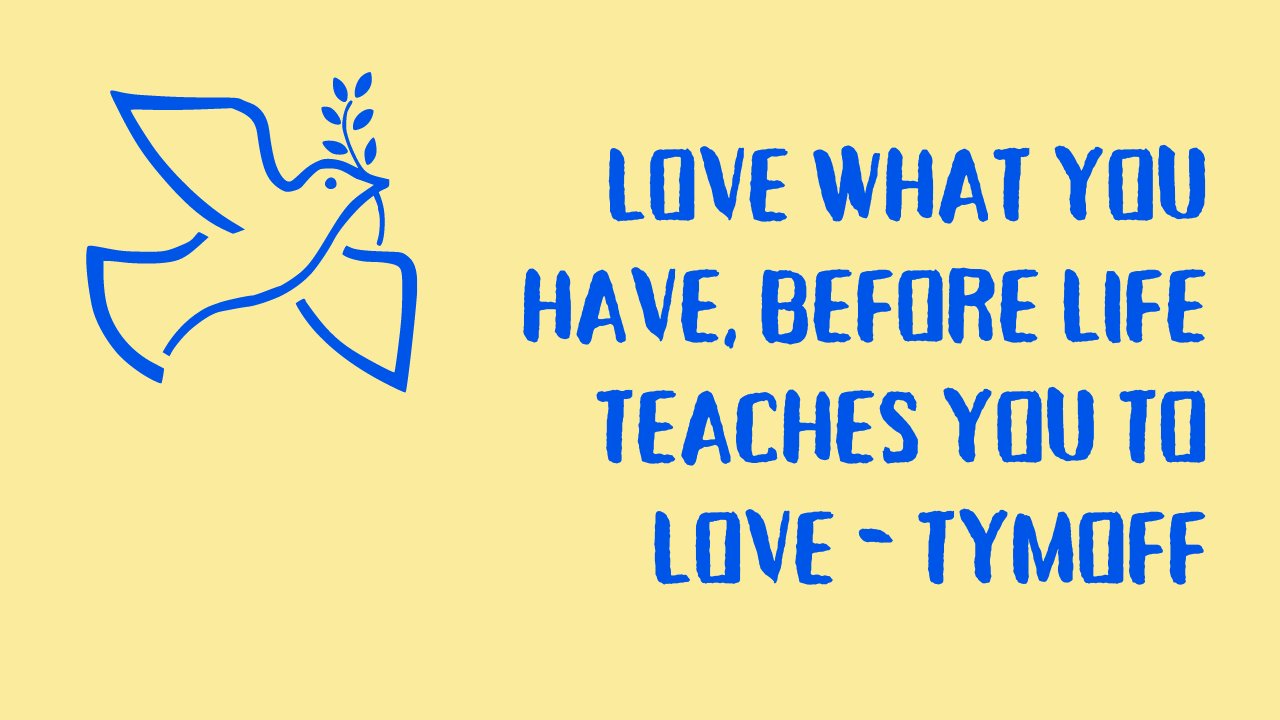love what you have, before life teaches you to lov – tymoff

love what you have, before life teaches you to lov – tymoff is a journey filled with unexpected twists and turns. Sometimes, we get so caught up in our daily struggles and desires that we forget to appreciate the things we already have. The quote “Love what you have, before life teaches you to love” by Tymoff serves as a poignant reminder to stop and take a moment to reflect on the blessings we often overlook. In this article, we’ll explore the importance of this message and how it can transform your outlook on life, helping you to find peace and contentment in the present.
Understanding the Meaning Behind “love what you have, before life teaches you to lov – tymoff”

At first glance, love what you have, before life teaches you to lov – tymoff this quote may seem like a simple piece of advice. But when you dive deeper, it reveals a powerful message about the importance of gratitude, self-awareness, and the human tendency to take things for granted. Let’s break down the meaning:
- “Love what you have”: This part of the quote encourages us to appreciate and value the things, people, and experiences already present in our lives. We often focus on what we lack, but the truth is, we already have so much to be thankful for.
- “Before life teaches you to love”: This suggests that life has a way of showing us the value of what we have, often in ways we don’t expect. Sometimes, we only realize the importance of something or someone once it’s gone or when it becomes a source of hardship.
In essence, Tymoff’s quote is a call to action—an invitation to start living in the moment and appreciating the present before it’s too late.
The Importance of Gratitude in Our Lives
Gratitude plays a crucial role in fostering a positive and fulfilled life. When we express gratitude for what we have, we shift our focus away from what we lack, creating a sense of contentment. Here’s why practicing gratitude is so important:
Gratitude Enhances Mental Health
- It helps reduce feelings of anxiety and depression by shifting our mindset from scarcity to abundance.
- Studies show that regularly practicing gratitude can increase happiness levels and improve overall mental well-being.
Gratitude Improves Relationships
- When we appreciate those around us, it strengthens our connections and helps us build trust and respect in our relationships.
- Simple acts of gratitude, like saying “thank you,” can make a big difference in how we relate to others.
Gratitude Boosts Physical Health
- Research has found that people who practice gratitude tend to experience fewer ailments and feel healthier overall.
- Grateful individuals often enjoy better sleep quality and lower blood pressure.
The Dangers of Taking Things for Granted
One of the most common pitfalls in life is taking what we have for granted. Whether it’s our health, relationships, or even our daily comforts, it’s easy to assume that these things will always be there. However, life has a way of showing us the fragility of our circumstances. Let’s look at some consequences of this mindset:
Loss of Appreciation
When we don’t appreciate the good things in our lives, we begin to take them for granted. This can lead to a lack of fulfillment, as we are constantly chasing after the next big thing without ever stopping to enjoy what’s in front of us.
Missed Opportunities
By focusing on what we don’t have, we often overlook the opportunities that are right under our noses. Whether it’s a new job opportunity, a chance to make a new friend or a small moment of joy, we may miss out on important moments because we’re too busy wanting more.
Regret
Sometimes, it’s only when something or someone is gone that we realize how much we took it for granted. This feeling of regret can be painful, and it serves as a hard lesson in the importance of appreciating what we have while it’s still there.
How to Start Loving What You Have
So, how can you begin to implement this mindset shift? It all starts with conscious effort. Here are some practical steps to help you love what you have:
- Practice Daily Gratitude
Start a gratitude journal where you write down three things you’re grateful for each day. This simple practice can help you refocus your mind on the positive aspects of your life.
- Spend Quality Time with Loved Ones
Rather than waiting until it’s too late, make the most of the time you have with your family, friends, and loved ones. Prioritize meaningful connections and cherish the moments you spend together.
- Mindfulness and Presence
Living in the moment is key to appreciating what you have. Whether you’re sipping a cup of coffee, walking outside, or spending time with family, try to be fully present. Avoid distractions and savor the experience.
- Let Go of Perfectionism
Instead of constantly striving for perfection or the next best thing, embrace the imperfections in your life. Understand that it’s okay to have flaws and that they are part of what makes life beautiful.
- Acknowledge Your Achievements
Take the time to reflect on your accomplishments and be proud of how far you’ve come. Recognize your growth and acknowledge the hard work that has brought you to where you are today.
The Role of Life Lessons in Learning to Love What You Have
Life is full of lessons, and sometimes, those lessons come in the form of challenges, loss, or hardship. These experiences teach us the true value of what we have, whether we realize it immediately or not. Here are some common ways life teaches us to love what we have:
Loss of Relationships
Often, we don’t realize how much a person means to us until they are no longer in our lives. Whether it’s due to distance, a breakup, or even death, the loss of a relationship forces us to reflect on the value it holds. This is when we learn the importance of cherishing the people around us.
Health Scares
Our health is one of the most precious things we often take for granted. A sudden illness or injury can serve as a wake-up call, reminding us to appreciate our bodies and take care of our physical well-being.
Financial Hardships
When we experience financial struggles, we gain a new perspective on material wealth. It’s easy to become consumed with the desire for more, but when we face scarcity, we often learn to appreciate the things that truly matter, like family, health, and happiness.
The Power of Contentment
Contentment is the key to unlocking a life of peace and happiness. When we are content, we stop chasing after the next best thing and start appreciating what we already have. Here’s how contentment can change your life:
- Reduced Stress: By learning to be content with what we have, we reduce feelings of stress and frustration. We stop constantly worrying about the future and instead find peace in the present.
- Increased Happiness: Contentment leads to happiness because it frees us from the need to compare ourselves to others or strive for things that don’t bring true joy.
- Improved Decision-Making: When we are content, we make better decisions because we are no longer driven by fear, jealousy, or a need for approval.
Overcoming the Urge for More
In a world that constantly tells us to “do more, be more, and have more,” it’s easy to feel dissatisfied. But the truth is, true happiness doesn’t come from external possessions or achievements—it comes from within. Here are some tips for overcoming the urge for more:
- Shift Your Focus: Instead of focusing on what you don’t have, shift your attention to what you already possess. It could be your health, relationships, talents, or personal growth.
- Embrace Minimalism: A minimalist lifestyle encourages you to let go of excess and focus on what truly adds value to your life. By simplifying, you can find greater joy in the things that matter most.
- Redefine Success: Success isn’t about accumulating more; it’s about living a life of purpose and fulfillment. Redefine your version of success and focus on what makes you truly happy.
Conclusion: Loving What You Have Is the Key to a Fulfilled Life
In the end, the message of “Love what you have, before life teaches you to love” is a timeless lesson that can help us lead more content and meaningful lives. By practicing gratitude, being present, and learning to appreciate the blessings we have, we can find joy in the simple things. Life will inevitably throw challenges our way, but with the right mindset, we can navigate them with grace and an appreciation for all that we have.
Remember, life is short, and the most precious things are often thehttps://stophavingaboringlife.com/love-what-you-have-before-life-teaches-you-to-lov-tymoff/ ones we overlook. Take a moment to reflect, appreciate, and love what you have before life teaches you to love.





